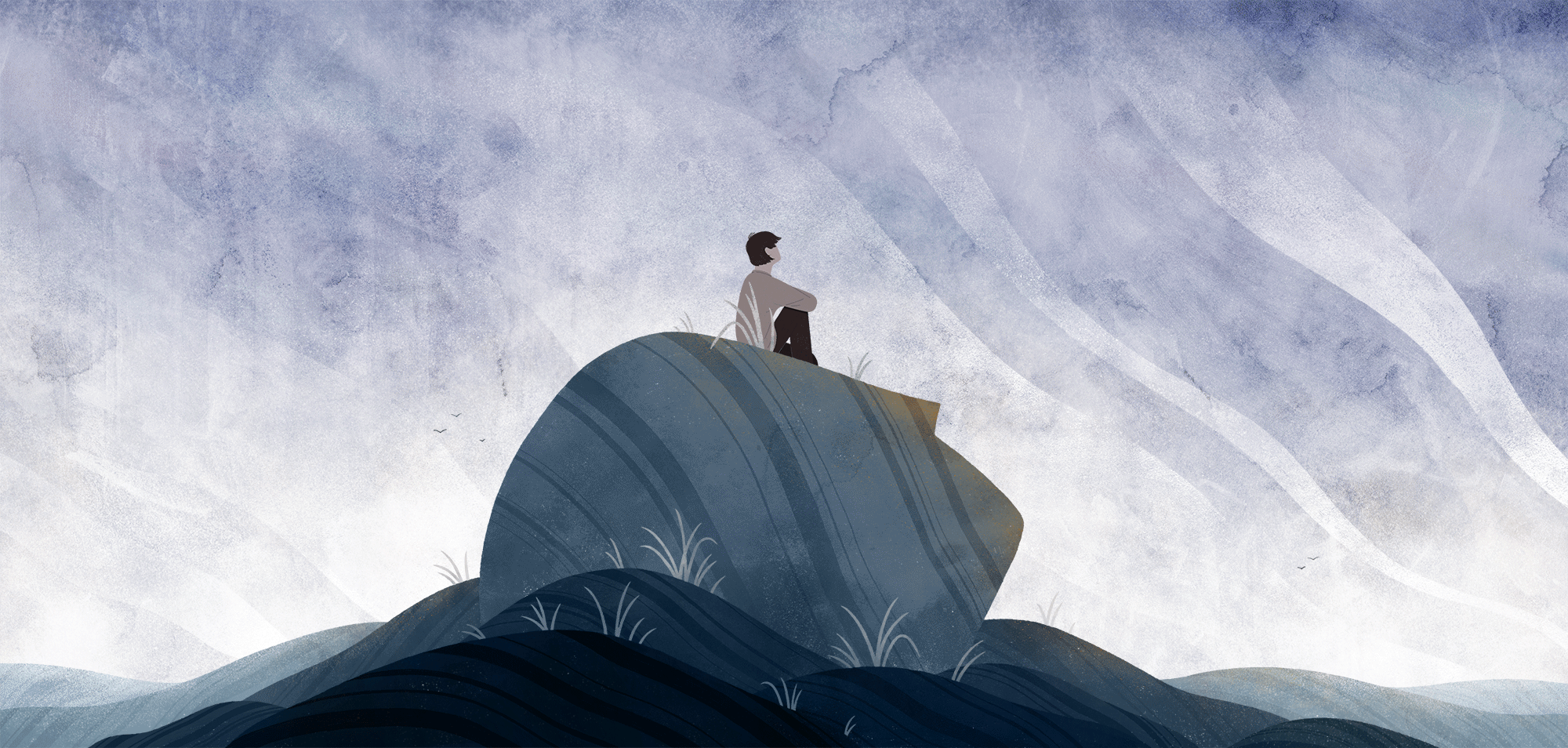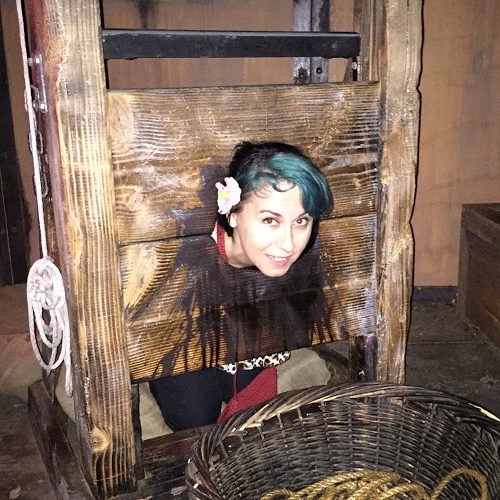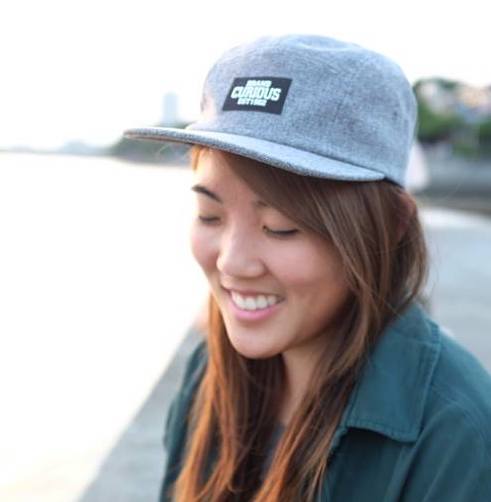A Promise of Flight
by Lee S. Bruce
Illustrated by Maggie Chiang | Edited by Julia Rios
May 2018
I thought my grandfather was losing his mind the day he asked me to fly.
I’d only been home from university a short while, when one night as we sat in the living room, he looked up from his crossword puzzle and said, “I hope you know I am very proud of you.”
“How could I not? You’re my biggest fan,” I said, then winked at him.
“And I always will be,” he said and winked back. “There’s something I want you to do. It would mean a lot to me”
It had been grandpa and I alone for as long as I could remember. He was a giant of a man and his stature often intimidated people. A fact that made the soft-spoken, kind man I loved chuckle to himself on more than one occasion.
“Anything. Name it,” I said.
“I want you to fly,” he said.
“I don’t …”
“Just promise me,” He interrupted. “I need to hear you say it. I know it might seem impossible, but I believe in you. You just have to believe in yourself.”
I thought he was making a joke at first, but he was so ardent that I nodded and said, “I promise.”
The next morning, I found him on the floor near his bed. He had fallen and slipped into a coma during the night.
Two weeks had passed and my grandfather was still unconscious. The doctors were uncertain about how long he would stay in a coma. They told me that the longer he was unconscious, the more likely it was that he wouldn’t wake up and if he did, he might be impaired in some way.
He looked so small, lying in the hospital bed. The thought of losing my only family made even my happy memories come crashing down in waves of tears. As a distraction, I focused on the promise that I made to him.
If I could keep my promise, maybe he would be all right.
And so I set out to fly.
I tried aerial classes, trapeze classes, acrobatic classes. They didn’t work. I bought a trampoline. It didn’t work either.
I read books on astral planes, out of body experiences, and meditation, and though they did help in my grieving process, they didn’t teach me how to fly.
I continued to meditate, though, and with every passing day my spirit felt a little lighter.
Months had passed and my grandfather still lay unconscious. I visited every day, hoping for a change. One night as I sat beside his bed, a swelling panic took hold of me. The pain was so intense that I thought it might be possible for my heart to physically break into two.
I didn’t know what to do, so I ran. And then I drove. And then I drove some more.
I had no idea where I was going,
it was after midnight when I pulled into a roadside turnout and got out of the car. I walked to the edge of the turnout, leaned against the waist-high stone barrier and looked down. Trees and gullies stretched out below as the canyon fell steeply away.
I climbed onto the stone wall, stood and looked out over the mountains, the only light shining from the harvest moon. Coyotes howled in the distance. I began to cry. Everything came rushing out in deep heavy sobs. A dull ache began to fill my head as my face contorted with grief.
It was too much. Between the panic and sadness, I’d lost my ability to think logically and I grasped onto the only clear thought in my head.
Fly.
It was illogical and impossible, but sorrow spurred my irrational behavior. I leaned forward and at that moment everything fell away.
The pain, the confusion, the sadness, it was all gone. All I knew was the feel of the wind sweeping past me as I fell.
“I can fly,” I tried to yell, but the rushing wind stifled my breath and voice. So I thought it hard, over and over again.
With hair whipping at my face, I focused on the words “I can fly.”
Still I fell.
It was subtle at first, the slowing. I barely noticed it. Then it began to take hold, or perhaps I began to take hold. It was as if I caught the wind, but it also felt as if time itself was decelerating. I began to feel like I was floating, almost like swimming, though it was the air itself that caused my buoyancy.
I was overtaken with a feeling of elation and I felt myself begin to rise. I was weightless. I was flying.
I began to soar. Over mountains and trees. Above meadows and lakes. Over cities, far above buildings.
I flew until every part of me was exhausted and called out for sleep. But my excitement wouldn’t keep.
As the sun edged up over the horizon, I flew back over the mountains and into the city, to the hospital where my grandfather was now awake and waiting for me.
I rushed to him and hugged him, bursting to tell him, but so happy to see him awake that I couldn’t speak for a moment.
“I did it grandpa!” I said, after I pulled myself together. “I flew. Honestly, I didn’t know what to think when you asked me to make that promise, but it was all I could focus on while you were sick.”
“I’m proud of you,” he said. “I’ve always known you could do anything, once you put your mind to it.”
He didn’t seem to be as astounded as I’d expected. But after all, he had believed I could fly, even when I didn’t believe it.
I stood and moved back from his bed and slowly began to rise from the floor. Again, I was weightless. I circled the room twice before swooping down to embrace him and carry him with me.
Bewildered at first, his expression slowly changed to that of child-like wonder. His laughter filled the air. The laugh I’d missed so much.
Slowly I descended to the ground and helped him back to his bed.
His eyes were rimmed with tears and he began to cry.
“What is it?” I said.
“I … I don’t know what to say, it’s some kind of miracle,” he said.
“But you knew, you believed in me.” I said. “I couldn’t have done it if you hadn’t asked me to make that promise.”
“Your grandmother and I never traveled because she had a fear of flying. Then she passed. I didn’t want you to let fear set limitations for you. Life is too short,” he said and then took my hand. “When I asked you to promise to fly, I meant in an airplane.”


